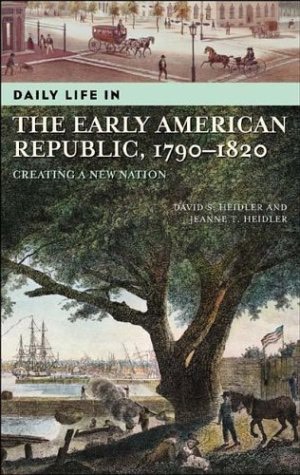In the early years of the American Republic the political ideals of the Revolution took definite form, and pervaded the daily lives of Americans in multifarious ways, affirming and transforming the country and its people in the process. Rapid developments in agriculture, encouraged by a strong sense of dignity in work and a bold new spirit of ingenuity sharply reduced the percentage of people who made their living in the fields; the tone of religious tolerance taken up by the founders manifested itself in a fervent yet incredibly diverse spiritual community; workingmen and educated citizens alike attended intellectual lectures together in an effort to become responsible and informed citizens; and the family dynamic underwent a profound transformation, especially as it involved children, at the hands of a new democratic idealism. In this informative and eminently readable resource, award-winning authors David and Jeanne Heidler discuss the people who lived during this critical time, and uncover the essential and unexpected realities of ordinary life in the early American republic. Included are sections on agriculture; rituals of life, love, and death; employment and the economy; leisure; religion; life beyond the mainstream; and life in the military. This volume is ideal for high school and college students, as well as anyone interested in examining the prosaic realities underpinning the lives of the people of the time. A chronology of the time period, maps, illustrations, a bibliography and an index are also included.
Excerpt
Americans of the Early Republic
In short, the Constitution and the government it created did not magically solve the new nation’s problems. The greater part of that task fell to ordinary Americans, a motley collection of diverse folk whom Europe rightly concluded were not much to look at. Most of the world’s ordinary people existed in drudgery, many under fierce oppression, and the bosses who superintended that oppression or dictated that drudgery, whether from ornate thrones or rude lairs, were complacent in their power. They watched with attitudes ranging from bemused skepticism to outright hostility as ordinary Americans undertook to build a republic so geographically immense and so idealistically principled that there had never been anything like it in the world. The countless names of these ordinary Americans would not make it into any history book nor would any of them ever regard their daily customs as particularly influential. But as individuals independently pursuing what turned out to be a collective dream, they were so different from anything before them they not only conquered their lands but also changed the world beyond them. With callused hands and sweat-soaked clothes, occasionally bloodied by a fight, they proved that courage, tenacity, and endurance could secure liberty and court fortune. There had never been anything like it, or them, in the world.
From Daily Life in the Early Republic, 1790-1820: Creating a New Nation (2004)
